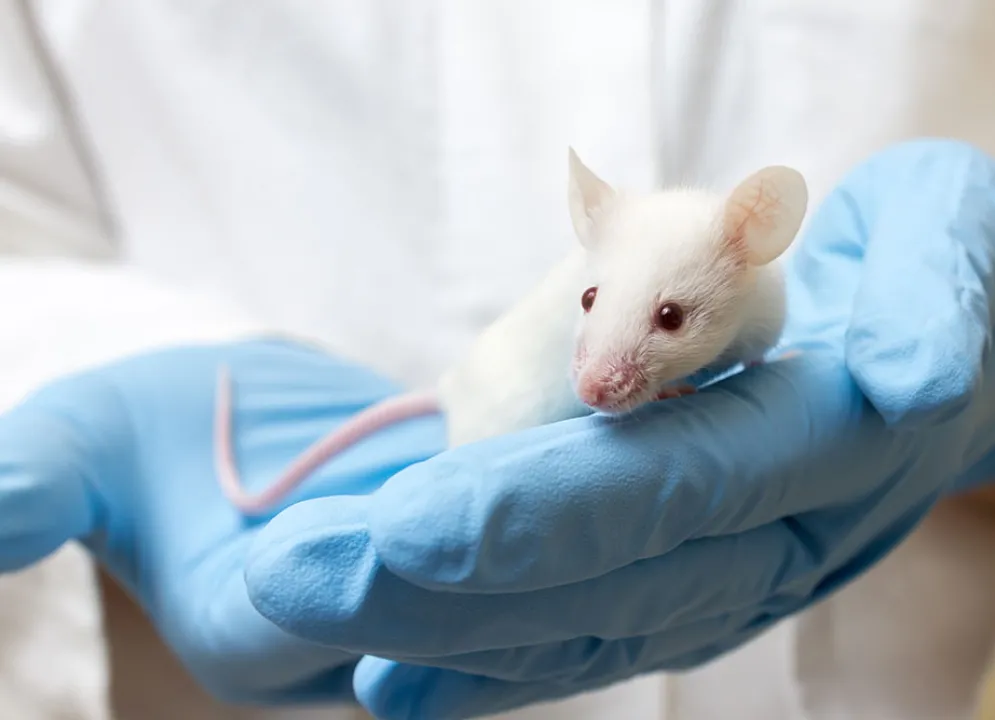Laboratory Animal Medicine Program
The Laboratory Animal Medicine Program (LAM) is administered by the University Laboratory Animal Resources (ULAR) and encompasses animals used for biomedical research throughout the institution. Clinical and husbandry support is provided daily to a wide variety of species used in biomedical research housed in nine centralized animal facilities. The Office of Research at Ohio State provides financial and administrative support for ULAR. The program provides residency and externship opportunities for veterinarians and veterinary students to gain experience in this specialty field. Faculty members in this area are actively involved in various academic pursuits to promote the field of laboratory animal medicine and facilitate research, animal care, and use enhancements.

Our Team
Veterinarians in the Laboratory Animal Medicine Program are clinical faculty in the Department of Veterinary Preventive Medicine and are assigned to the University Laboratory Animal Resources (ULAR). Our faculty are Diplomates of the American College of Laboratory Animal Medicine (ACLAM) and are dedicated to providing the university’s research community with the highest quality animal resource to support their research. They promote and assure humane care and use of animals through compliance with the Animal Welfare Act, the Guide for the Care and Use of Laboratory Animals, AAALAC International, and university policies. The services that they provide includes veterinary health and surgical care, technical services, training, and expertise in laboratory animal technology and medicine. They also serve as liaisons between the researcher and the institution and regulatory and accrediting organizations.
Program Personnel
Education and Training
Students participate in medical rounds, seminars, and experiments. Attendance at the National AALAS meeting (Oct/Nov) or Charles River short course (June) are encouraged if timing allows. Students will actively assist in physical examinations, assessments, differential diagnosis, and treatment of laboratory animals under the supervision of the ULAR veterinary staff. Observe experiments, attend seminars on lab animal topics, and participate in handling/training labs as available during the time period.
Learn more (https://research.osu.edu/research-responsibilities-and-compliance/anima…)
The Ohio State University Laboratory Animal Medicine Program provides externships for the Summer Veterinary Scholar Research Program. This 12-week paid program is designed to provide the trainee with a broad exposure to all facets of laboratory animal medicine and its various disciplines including: research, management, clinical medicine, diagnostic services, training, experimental surgery, pathology, and phenotyping. This mentorship allows students to participate in rounds, seminars, clinical cases to include interaction with researchers, diagnostic work-ups, treatments, and necropsies. Time is allotted for working directly with a Mentor who will supervise the trainee in a clinical research project and throughout the externship experience.
Learn more (https://research.osu.edu/research-responsibilities-and-compliance/anima…)
This ACLAM certified training program is 36 months long and designed to provide trainees with broad exposure to all facets of laboratory animal medicine for a multitude of careers in biomedical research.
Trainees are required to spend time in selected laboratories for a mentored research experience. The research project must include work with laboratory animals, be reasonable to complete within the expected timeline, and have the potential to result in a first-author manuscript for the trainee. In addition to the laboratory experience, trainees will participate in a research journal club led by faculty members which will discuss current articles and methodologies that are utilized in biomedical research.
The American College of Laboratory Animal Medicine sponsors a summer fellowship for an Ohio State veterinary student for the purpose of gaining experience in and/or exposure to the field of laboratory animal medicine. Any OSU veterinary student interested in this field is strongly encouraged to consider applying for this opportunity. For more information click on our link.
Learn more (https://research.osu.edu/research-responsibilities-and-compliance/anima…)
Professional Education and Community Outreach
The program actively promotes the advancement of knowledge in the fields of Laboratory Animal Medicine and Human Medicine in a variety of ways.
LAM personnel continually demonstrate their knowledge of Laboratory Animal Medicine by presenting information either in wet labs, presentations, or posters at the national meetings of the American Association for Laboratory Animal Science (AALAS). The AALAS National Meeting is sponsored annually in different locations across the United States. Those with backgrounds and expertise in research, clinical care, management, and husbandry of animal models used in biomedical research are encouraged to attend. There are a multitude of educational opportunities available for meeting attendees including: special topic lectures, panel discussions, platform sessions, seminars, workshops, and technician-specific offerings such as the Technician Fun Fair and the Learning Resources Center. Vendors are also available to offer the opportunity to learn more about their products and services.
Our program assists the Ohio State Agricultural Science Interns, Columbus State Veterinary Technology Degree Program , the Ohio Veterinary Medical Association (OVMA), and the Student Chapter of the American Society of Laboratory Animal Practitioners. Activities include:
- Wet labs, for exposure to common lab animal species to include handling, enrichment and current techniques in the care of these species.
- Wet lab support for the training of medical techniques.
- Discussions/lectures on the variety of species dealt with in lab animal medicine.
- Provide information/speakers for Career Exploration type programs on the exciting available careers in Lab Animal Medicine.
- Internship opportunities for Ohio State Animal Science students interested in lab animal medicine. The experience includes basic exposure to operations, surgery, medicine, as well as a preventive medicine program.
- Externship programs which give the student the opportunity to work closely with Board Certified Laboratory Animal Veterinarians, Registered Veterinary Technicians and support staff.
Our department provides animals and support for outside medical organizations. These organizations have training personnel with certification credentials and CEU granting privileges for personnel at Doctors Hospitals, Southern Ohio Medical Center, OU Lancaster, Youngstown EMS Program and other fire departments.
Past support provided includes:
- Advanced Trauma Life Support (ATLS)
- Perfusion Anatomy and Trauma Techniques
- Other courses may also be requested
If you are interested in more information concerning any of the available training please contact:
- Training Department: 614-292-5094, ulartraining@osu.edu
- Surgery Department: 614-292-0011, ulartraining@osu.edu
- Visit our web site! http://ular.osu.edu/training/
Resources for Ohio State Researchers
A variety of research activities at The Ohio State University involve animals including Biomedical Research, Agricultural Research, and Clinical Trials. The goals of these activities include improving the health care for animal species used as pets, evaluating new drug therapies, and understanding the mechanisms of diseases that afflict humans and animals. Extensive effort is made to provide excellent care for animals used in research, to gain the maximum amount of information from every animal used, and to minimize procedures that have potential for discomfort, distress, or pain.
Biomedical Research can be conducted on traditional laboratory and agricultural animals and is done to aid and support the field of medicine for the improvement of human and animal health. This involves developing, evaluating, and studying the safety of treatments, therapies, drugs, and devices. Requirements concerning this type of research involve following the Animal Welfare Act and the Public Health Services Policy. The AWA is enforced by APHIS under the auspices of the USDA. The Ohio State University is registered under the USDA ( Reg. 31-R-0014) and inspected regularly. The Ohio State University is also accredited by the Association for the Assessment and Accreditation for Laboratory Animal Care International (AAALAC) which is a requirement for many funding sources including NIH.
To perform biomedical research at Ohio State you must have an approved Institutional Animal Care and Use Committee (IACUC) protocol. There are training requirements that must be met prior to submitting an animal use protocol to IACUC. Access to forms, information on protocol submission and training requirements can be found under the IACUC tab on the Office of Research’ - Office of Responsible Research Practices web site. IACUC protocols require a signature from the University Laboratory Animal Resource (ULAR) veterinarian prior to submission. The ULAR veterinarians and staff are also available if you need assistance with filling out the protocol form. You can find all the information you need including contact information for the veterinarians and staff at ULAR.
Agricultural Research involves a variety of agricultural species and is performed for the improvement of animal nutrition, breeding, management or production efficiency, or improvement of the quality of food or fiber. The Agricultural Animal Care and Use Committee for the College of Food, Agricultural and Environmental Sciences (the AgACUC) oversees this research. More information can be found at the following web site.
Clinical Trials are conducted at the College of Veterinary Medicine on privately owned animals as part of the ongoing mission to provide new leading edge veterinary medical care for their patients. This involves developing, evaluating, and studying the safety of treatments, therapies, drugs, and devices. More information on setting up a clinical trial or enrolling an animal into a clinical trial can be found at the following web site.





